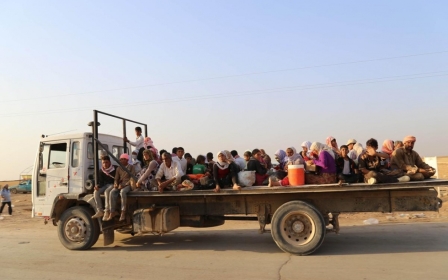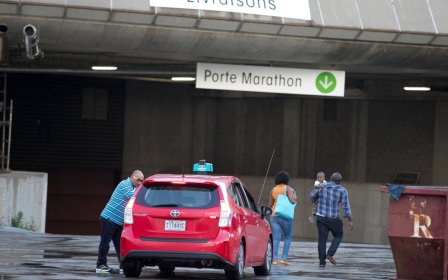‘What is your religion?’ Canada questioning of asylum seekers sparks concern

MONTREAL, Canada - Canada’s Ministry of Public Safety has suspended the use of a controversial questionnaire used during interviews with asylum seekers crossing illegally from the US because it is "inappropriate" and inconsistent with government policy, a spokesperson said.
The move comes after civil rights groups raised concerns over the questionnaire that Canada’s federal police have used during interviews with asylum seekers.
Thousands of asylum seekers have crossed the US border without visas in recent months. The Royal Canadian Mounted Police intercepted 2,996 asylum seekers who had crossed into Quebec without visas in July, and another 5,530 asylum seekers in August.
The RCMP interview guide, first revealed by the Toronto Star newspaper, includes several questions about religious practices and political beliefs and values, and appears to specifically target Muslim asylum seekers.
“What is your religion?” appears among dozens of questions in the guide, as does a follow-up question about how often interviewees practise their religion.
“Canada is a very liberal country that believes in freedom of religious practice and equality between men and women. What is your opinion on this subject?” the document reads.
“How would you feel if your boss was a woman?” it continues.
The guide goes on to suggest asking asylum seekers how they feel about women who do not wear headscarves (hijabs), full-face veils (niqabs) or full-body coverings (burqas), among other religious garments.
It also includes questions about the asylum seekers’ political beliefs, whether they belong to any political organisations or plan to attend protests about issues in their home country while in Canada.
It also asks what asylum seekers think about the Islamic State (IS) group.
It is “completely unacceptable” for the RCMP to ask questions about asylum seekers’ religious practices, the National Council of Canadian Muslims (NCCM) said on Thursday in a brief Facebook statement.
The advocacy group said it was “deeply concerned about this report on religious profiling” and it said it was engaging the Canadian government on the matter.
'Completely unacceptable'
A spokesperson for Canada’s Ministry of Public Safety told Middle East Eye that the RCMP has suspended the use of that version of the questionnaire.
“The minute we became aware of the interview guide, we were immediately concerned and contacted the RCMP. Some of the questions were inappropriate and inconsistent with government policy,” Scott Bardsley said in an email.
Bardsley said the interview guide was used exclusively in Quebec.
The minute we became aware of the interview guide, we were immediately concerned and contacted the RCMP
- Scott Bardsley, Ministry of Public Safety spokesperson
The French-speaking province in eastern Canada has seen an influx of asylum seekers crossing the border from the US without visas in recent months.
A bilateral agreement blocks asylum seekers who first land in the US from making an asylum application in Canada, save for a few exceptions, on the basis that the US is a “safe country” for refugees.
But once asylum seekers are on Canadian territory, they can have their asylum claims heard. That loophole in the Safe Third Country Agreement is what has pushed thousands to cross the border illegally.
RCMP 'risk assessment'
The RCMP is the first point of contact for anyone that does not cross the Canada-US border at an official crossing. RCMP agents conduct a so-called “preliminary risk assessment” for anyone it detains while crossing the border without a permit.
“Due to the high volume of irregular migrants in Quebec, an interview guide was developed,” RCMP spokesperson Annie Delisle told MEE in an email, about the purposes of the questionnaire.
“When individuals are intercepted crossing the border illegally, their intentions are not known. Officers utilise the tools at their disposal to confirm the identity of the individuals and to assess their activities and intentions while respecting the human rights of the individual,” she said.
Delisle said the RCMP does not have statistics on how many asylum seekers were interviewed using the guide.
But the questionnaire “has been revised to better evaluate individuals coming into the country whose origin is unknown, while being respectful of their situations,” she said.
After the preliminary RCMP interview, asylum seekers are transferred to the Canada Border Services Agency (CBSA).
If they are eligible to make a refugee claim in Canada, they will then be released pending a hearing with Canada’s Immigration and Refugee Board. The IRB is an independent body that decides on asylum claims in Canada.
Delisle said the information obtained through the interviews is being kept in an RCMP database.
It can be shared with the CBSA “or other partners, in accordance with Canadian legislation pertaining to the sharing of such information”.
In late August, The Canadian Press reported that Canadian border agents had quietly started to share information about US citizens who cross into Canada every day with the US Department of Homeland Security.
Canada and the US have several information-sharing agreements in place.
Stay informed with MEE's newsletters
Sign up to get the latest alerts, insights and analysis, starting with Turkey Unpacked
Middle East Eye delivers independent and unrivalled coverage and analysis of the Middle East, North Africa and beyond. To learn more about republishing this content and the associated fees, please fill out this form. More about MEE can be found here.




